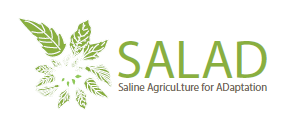SALAD - Saline Agriculture as a Climate Adaptation Strategy
SALAD - Saline Agriculture as a Climate Adaptation Strategy

Research object
Climate change is affecting coastal areas through sea level rise and droughts. This increases salinity in soils and affects food production systems (food system) overburdened by a growing world population. Progressive salinization is one of the main causes of soil degradation in Europe and North Africa and is putting increasing pressure on conventional agriculture. Therefore, the aim of the inter- and transdisciplinary project SALAD (Saline Agriculture as a Strategy to Adapt to Climate Change) is to improve the resilience of food production in (potentially) saline areas in the Mediterranean and North Sea regions by (1) supporting the development and sustainable use of innovative salt-tolerant crops, (2) identifying and further developing methods of crop production adapted to saline conditions, (3) researching and testing innovative market introduction techniques and tools for upscaling crop/food chains, and (4) advancing knowledge exchange and transfer of practical and adaptive solutions.
The contribution of the Ecological Economics team to the collaborative project will especially contribute to the achievement of objectives 3 and 4. Work packages 3 and 6 are led and coordinated by ÖkÖk. The goal is to promote upscaling (know-how and expertise, higher organizational levels) and diffusion of the innovative practices by engaging stakeholders, synthesizing case studies and project results, and identifying effective, context-specific as well as transferable solutions and governance options. In addition, a digital database will be established for sustainable use beyond the project consortium. Thus, a first comprehensive mapping of international initiatives on saline agriculture, a first comprehensive policy analysis on salinization, and an integrated analysis of knowledge transfer in this field will take place.
Method / Approach
The SALAD project follows interdisciplinary and transdisciplinary approaches. A major role is played by bringing together, synthesizing, and systematically analyzing experiences, interests, and preferences from the various case studies within the project and using different methods, such as stakeholder mapping, network analysis, workshops, interviews, and document analysis.
Duration
June 2021 – Mai 2024
Funding
The SALAD project (Saline Agriculture as a Strategy to Adapt to Climate Change) is funded by the Horizon 2020 ERA-NET-Cofund on Food Systems and Climate (FOSC) (grant agreement No 862555).
Partners
- IVM- Vrije Universiteit Amsterdam (VU University Amsterdam) (Netherlands, Coordinator)
- Institute Flanders Research Institute for Agriculture, Fisheries and Food (Belgium)
- Katholieke Universiteit Leuven (Belgium)
- Kafrelsheikh University (Egypt)
- Carl von Ossietzky University Oldenburg (Germany)
- University of Florence (Italy)
- Mohammed VI Polytechnic University (Morocco)
- The Salt Doctors BV (Netherlands)
- Salt Farm Foundation (Netherlands)
- University of Applied Sciences Van Hall Larenstein (Netherlands)
- Cadi Ayyad University (Morocco)


